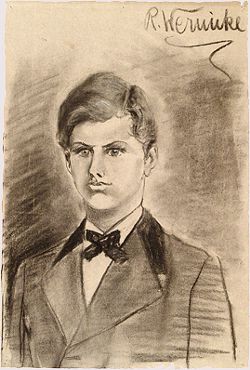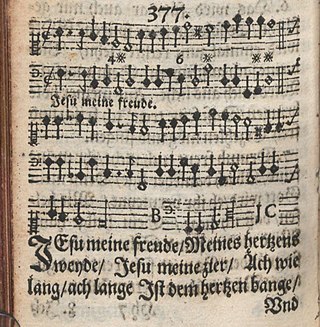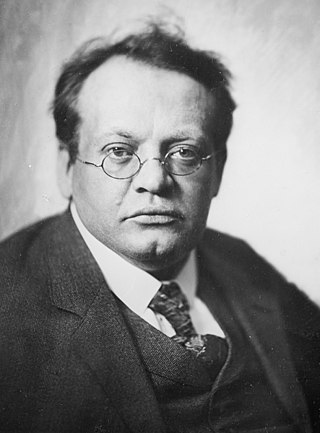
Johann Baptist Joseph Maximilian Reger was a German composer, pianist, organist, conductor, and academic teacher. He worked as a concert pianist, a musical director at the Leipzig University Church, a professor at the Royal Conservatory in Leipzig, and a music director at the court of George II, Duke of Saxe-Meiningen.

Henri Marteau was a French violinist and composer.

Wilhelm Reinhard Berger was a German composer, pianist and conductor.

Max Reger's 1915 Requiem, Op. 144b, is a late Romantic setting of Friedrich Hebbel's poem "Requiem" for alto or baritone solo, chorus and orchestra. It is Reger's last completed work for chorus and orchestra, dedicated in the autograph as Dem Andenken der im Kriege 1914/15 gefallenen deutschen Helden.

The Reger-Chor is a German-Belgian choir. It was founded in Wiesbaden in 1985 and has been conducted by Gabriel Dessauer in Wiesbaden. Since 2001 it has grown to Regerchor-International in a collaboration with the organist Ignace Michiels of the St. Salvator's Cathedral of Bruges. The choir performs an annual concert both in Germany and Belgium of mostly sacred choral music for choir and organ. Concerts have taken place regularly in St. Bonifatius, Wiesbaden, and in the cathedral of Bruges in its series "Kathedraalconcerten". The choir performed additional concerts at other churches of the two countries and in the Concertgebouw of Bruges.

Hans-Christoph Rademann is a German choral conductor, currently the director of the Dresdner Kammerchor and the Internationale Bachakademie Stuttgart.

"Jesu, meine Freude" is a hymn in German, written by Johann Franck in 1650, with a melody, Zahn No. 8032, by Johann Crüger. The song first appeared in Crüger's hymnal Praxis pietatis melica in 1653. The text addresses Jesus as joy and support, versus enemies and the vanity of existence. The poetry is bar form, with irregular lines from 5 to 8 syllables. The melody repeats the first line as the last, framing each of the six stanzas.

"Christ ist erstanden" is a German Easter hymn, and is possibly the oldest Christian liturgical German song. It has inspired the music of numerous composers, such as Ludwig Senfl and Heinrich Schütz, as well as modern composers such as Oskar Gottlieb Blarr and Enjott Schneider, and has appeared in 45 hymnals, including the current German Catholic and Protestant hymnals. Translations and paraphrases include a version by Catherine Winkworth which has appeared in 231 hymnals. "Christ ist erstanden" also inspired Martin Luther to write "Christ lag in Todes Banden", deriving the melody from it.

Unser lieben Frauen Traum Op. 138, No. 4, is a sacred motet for unaccompanied mixed choir by Max Reger. The German text is a poem by an anonymous poet, derived from a Volkslied. The piece is in F major and scored for up to six voices, SSATBB. Composed in Meiningen in 1914, it was published in 1916 after Reger's death as the fourth of Acht geistliche Gesänge. It is often performed in Advent.

Der Mensch lebt und bestehet, Op. 138, No. 1, is a sacred motet for unaccompanied mixed choir by Max Reger. The German text is a poem by Matthias Claudius, beginning with "Der Mensch lebt und bestehet nur eine kleine Zeit". The piece is in A minor and scored for eight voices in two choirs SATB. Composed in Meiningen in 1914, it was published in 1916 after Reger's death as the first of Acht geistliche Gesänge.

Der Einsiedler Op. 144a, is a composition for baritone soloist, five-part choir and orchestra by Max Reger, written in 1915. The German text is a poem by Joseph von Eichendorff, beginning "Komm' Trost der Welt, du stille Nacht". The composition was published in 1916 after Reger's death by N. Simrock, combined with the Hebbel Requiem, as Zwei Gesänge für gemischten Chor mit Orchester, Op. 144.

Geistliche Gesänge, Op. 110, are three motets by Max Reger. He composed them between 1909 and 1912:

Abendlied, Op. 69/3, is a sacred motet by Josef Rheinberger for a six-part mixed choir (SSATTB). It has been regarded as his best-known sacred composition. He wrote the first version in 1855 at the age of 15.
Helmut Kahlhöfer was a German church musician and academic teacher. He was the founder and for decades the conductor of the choir Kantorei Barmen-Gemarke.

Two Songs for Voice, Viola and Piano, Op. 91, were composed by Johannes Brahms for his friends Joseph Joachim and his wife Amalie. The text of the first song, "Gestillte Sehnsucht", is a poem by Friedrich Rückert, composed in 1884. The text of the second, "Geistliches Wiegenlied" was written by Emanuel Geibel after Lope de Vega, and set to music in 1863. They were published together in 1884.

"Macht hoch die Tür" is a popular German Advent hymn, written in 17th century Ducal Prussia. The lyrics were written by Georg Weissel in 1623 for the inauguration of the Altroßgärter Kirche in Königsberg. The melody that is now associated with the text appeared first in 1704 in the hymnal by Johann Anastasius Freylinghausen.

Two Motets, Op. 74, are two sacred motets for unaccompanied mixed choir by Johannes Brahms, published together. Number 1, composed in 1877 in several movements, is Warum ist das Licht gegeben dem Mühseligen?, based on Biblical texts and a chorale. Number 2, believed to have been composed in 1863/64, is O Heiland, reiß die Himmel auf, containing different settings of the stanzas of Friedrich von Spee's "O Heiland, reiß die Himmel auf". The two motets were published by N. Simrock in December 1878 and dedicated to Philipp Spitta.
"Morgenglanz der Ewigkeit" is a Christian hymn with German text originally by Christian Knorr von Rosenroth, written around 1690 and set to music for private devotion. It became known with a 1662 melody by Johann Rudolf Ahle. The song is part of modern German hymnals and songbooks. It was translated to English as "Come, Thou Bright and Morning Star", and as "Dayspring of Eternity".














